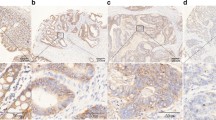Abstract
CD44s is a cell adhesion molecule, which belongs to the family of hyaluronan binding proteins. Anti-body to CD44s is used to establish the association of its expression with the clinicopathological characteristics of colorectal cancer using immunohistochemical methods. The aim of this study is to investigate the expression of the standard form of CD44 (CD44s) in colorectal cancer tissues as compared to adjacent normal colonic tissues. Furthermore, the level of expression of CD44s in colorectal cancer tissues was correlated with the degree of histological differentiation, Duke’s classification, sex, size and site of the tumor. Immunohistochemical analysis for CD44s was carried out in 49 paraffin-fixed sections of neoplastic colorectal tissues and nonneoplastic ones adjacent to the lesion, by the standard peroxidase-antiperoxidase method. Expression of these antigens were compared in normal and malignant epithelium and stromal cells. The results show that the level of CD44s in the epithelial and stromal cells was significantly higher in the colorectal cancer tissues than the normal ones. However, there was no association between the percentages of expressions of CD44s and the degree of histological differentiation, Duke’s classification, sex or size of the tumor. There was however, a significantly higher expression of CD44s in the epithelium of rectal cancer than that of colonic cancer. This study indicates that the expression of CD44s is significantly higher in colorectal cancer tissues. However, further studies are required to understand its role in tumor progression and metastasis of this disease.
Similar content being viewed by others
References
Hart I, Goode N, Wilson R: Molecular aspects of metastatic cascade. Biochem Biophys Acta 989: 65–84, 1989
Screaton GR, Bell MV, Jackson DG, et al: Genomic structure of DNA encoding the lymphocyte homing receptor CD44 reveals at least 12 alternatively spliced axons. Proc Natl Acad Sci USA 89:12160–12164, 1992
Tolg C, Hofmann M, Herrlich P, Ponta H: Splicing choice from ten variant exons establishes CD44 variability. Nucleic Acids Res 21: 1225–1229, 1993
Sleeman J, Moll J, Sherman L, et al. The role of CD44 splice variants in human metastatic cancer: Cell adhesion and human disease. Chichester (Ciba Foundation Symposium 189), Wiley, pp 142–56, 1995
Bartolazzi A, Jackson D, Bennett K, et al: Regulation of growth and dissemination of a human lymphoma by CD44 splice variants. J Cell Sci 108:1723–1733, 1995
Gunthert U, Hofmann M, Rudy W, et al: A new variant of glycoprotein CD44 confers metastatic potential to rat carcinoma cells. Cell 65: 13–24, 1991
Seiter S, Arch R, Reber S, et al: Prevention of tumor metastasis formation by anti-variant CD44. J Exp Med 177: 443–455, 1993
Haynes B, Telen M, Hale L, Denning S: CD44-a molecule involved in leukocyte adherence and T-cell activation. Immunol Today 10: 423–428, 1989
Ropponen KM, Eskelinen MJ, Lipponen PK, et al: Expression of CD44 and variant proteins in human colorectal cancer and its relevance for prognosis. Scan J Gastroenterol 33: 301–309, 1998
Trowbridge I, Lesly J, Schulte R, et al: Biochemical characterization and cellular distribution of a polymorphic, murine cellsurface glycoprotein expressed in lymphoid tissues. Immunogenetics 15: 299–312, 1982
Herrlich P, Pals S, Ponta H: CD44 in colon cancer. Eur J Cancer 31:1110–1112, 1995
Boland CR, Kim YS: Transitional mucosa of the colon and tumor growth factors. Med Hypotheses 22: 237–243, 1987
Fox S, Fawcett J, Jackson DG: Normal human tissues, in addition to some tumors, express multiple different CD44 isoforms. Cancer Res 54:4539–4546, 1994
Hamilton PW, Watt PC, Allen DC: A morphometric assessment of transitional mucosa in the colon. Histopathology 13: 519–530, 1988
Isaacson P, Attwood PR: Failure to demonstrate specificity of the morphological and histochemical changes in mucosa adjacent to colonic carcinoma (transitional mucosa). J Clin Pathol 32:214–218, 1979
Sugino T, Gorham H, Yoshida K, et al. Progressive loss of CD44 gene expression in invasive bladder cancer. Am J Path 149:873–882, 1996
Wielenga VJM, Heider KH, Offerhaus GJA, et al. Expression of CD44 variant protein in human colorectal cancer is related to tumor progression. Cancer Res 53: 4754–756, 1993
Herrlich P, Zoller M, Pals ST, Ponta H. CD44 slice variants: Metastases meet lymphocytes. Immunol Today 14: 395–399, 1993
Tanabe KK, Ellis LM, Saya H: Expression of CD44RI adhesion molecule in colon carcinomas and metastases. Lancet 341:725–726, 1993
East J, Hart IR: CD44 and its role in tumor progression and metastasis. Eur J Cancer 29A: 1921–1922, 1993
Mulder JW, Kruyt PM, Sewnath M, et al: Colorectal cancer prognosis and expression of exon-v6-containing CD44 proteins. Lancet 344: 1470–1472, 1994
Koopman G, Heider KH, Horst E, et al. Activated human lymphocytes and aggressive non-Hodgkin’s lymphomas express a homologue of the rat metastasis-associated variant of CD44. J Exp Med 177: 897–904, 1993
Orzechowski HD, Beckenbach C, Herbst H, et al: Expression of CD44v6 is associated with cellular dysplasia in colorectal epithelial cells. Eur J Cancer 31A: 2073–2079, 1995
Mulder JW, Wielenga VJ, Polak MM, et al: Expression of mutant p53 protein and CD44 variant proteins in colorectal tumorigenesis. Gut 36:76–80 1995
Gotley DC, Fawcett J, Walsh MD, et al: Alternatively spliced variants of the cell adhesion molecule CD44 and tumor progression in colorectal cancer. Br J Cancer 74: 342–351, 1996
Abbasi AM, Forbes A, Chester KA, et al. Putatively metastatic specific CD44V6 is also expressed in normal colon and in human colorectal tumors. J Pathol175(suppl): 137A, 1995
Imazeki F, Yokosuka O, Yamaguchi T, et al. Expression of variant CD44-massanger RNA in colorectal adenocarcinomas and adenomatous polyps in humans. Gastroenterology 110: 362–368, 1996
Author information
Authors and Affiliations
Corresponding author
Rights and permissions
About this article
Cite this article
Khoursheed, M., Mathew, T.C., Makar, R.R. et al. Expression of CD44s in human colorectal cancer. Pathol. Oncol. Res. 8, 170–174 (2002). https://doi.org/10.1007/BF03032390
Received:
Accepted:
Issue Date:
DOI: https://doi.org/10.1007/BF03032390




